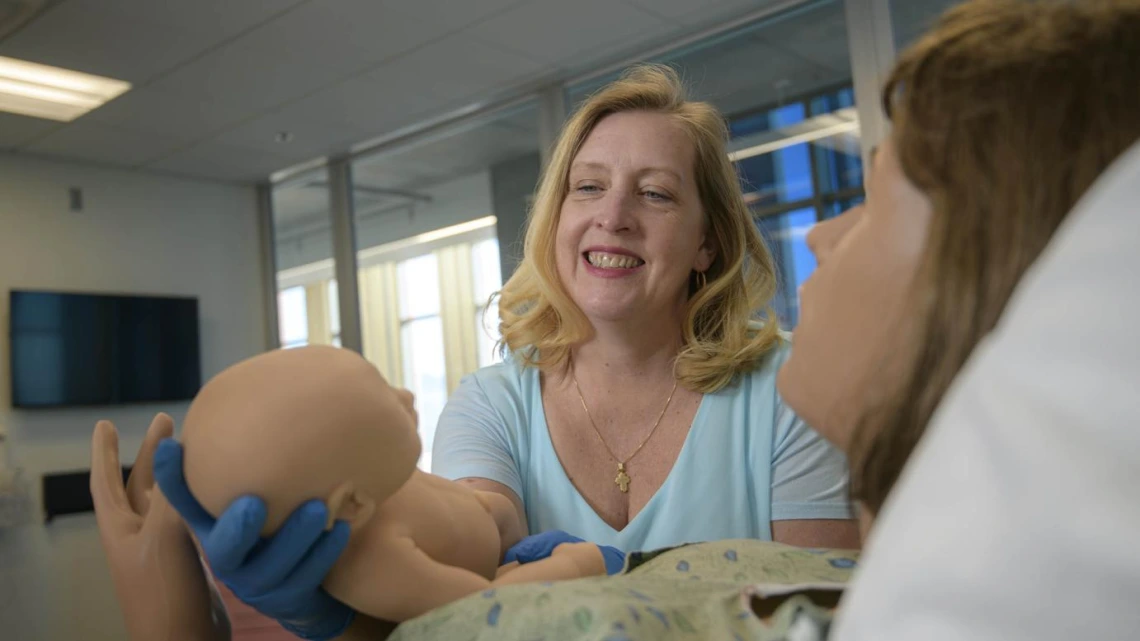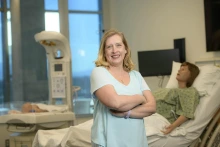UArizona Nursing's New Nurse-Midwifery Specialty Will Increase Workforce Diversity and Access to Care

In August, the Accreditation Commission for Midwifery Education (ACME) granted the University of Arizona College of Nursing's Doctor of Nursing Practice (DNP) Nurse-Midwifery program pre-accreditation status.
One of three new University of Arizona Health Sciences (UAHS) degree programs recently approved by the Arizona Board of Regents, UArizona Nursing's Nurse-Midwifery DNP specialty will soon begin enrolling students for 2022. Alongside UAHS’ new physical therapy and physician assistant programs, the specialty will create an expanded pipeline of skilled providers to provide greater access to care for patients in Arizona’s diverse rural and urban communities.
“My goal is to establish a midwifery program that creates more nurse-midwives and develops a more diverse profession that is representative of the communities that we serve," ~ Erin McMahon, EdD, CNM, FACNM, Director, Nurse Midwife Program
According to Erin McMahon, EdD, CNM, FACNM, Director, Nurse Midwife Program, a nurse-midwife can care for a person throughout their lifespan and address all aspects of their reproductive and sexual health, which can include cancer screenings, family planning, contraception, perimenopausal or menopausal care. “It really covers a breadth of clinical needs,” Dr. McMahon said. “We do so by looking at the individual, their support systems, and taking a holistic view of their health and wellness.”
The need for nurse-midwives is growing as the field of obstetrics and gynecology (OB-GYN) is seeing its workforce shrink. According to a 2017 report from the American College of Obstetricians and Gynecologists, nearly 1 in 3 OB-GYN doctors were aged 55 or older and nearing retirement. At the same time, younger doctors were trending away from general OB-GYN practice in favor of more specialized fields.

Erin McMahon, EdD, CNM, pictured in front of a birthing manikin in the Arizona Simulation Technology and Education Center, says there has been a push to increase the number of academic midwifery programs graduating more nurse-midwives.
The United States is experiencing a maternal health crisis. According to the CDC, in 2020 861 women died related to childbirth and that is up from 754 in 2019. Women of color are disproportionately impacted by these statistics.
Additionally, access to prenatal and obstetric services are decreasing in rural areas due to closures of obstetric units and rural and critical access hospitals. Several of Arizona’s counties have very few or even no obstetric providers. Nearly half of the women in some rural areas must travel for more than 30 minutes to receive maternity care.
Dr. McMahon believes the new nurse-midwifery specialty will address those issues. She hopes to recruit registered nurses from communities across the state who can then return to work in their communities as nurse-midwives.
The Nurse-Midwifery program will prepare the certified nurse-midwife (CNM) to independently provide care during pregnancy, childbirth and the postpartum period. The CNM scope of practice includes gynecologic care, family planning, preconception care, and care of the healthy newborn for the first 28 days of life. CNMs provide primary care to individuals across the life span, inclusive of all gender identities and sexual orientations. Care may be provided in a variety of settings including, but not limited to, private practice, community health centers, ambulatory clinics, hospitals, birthing centers and the home setting.
The Nurse-Midwifery (DNP-NM) specialty is a hybrid program utilizing a mixture of online didactic coursework, on-campus intensives and clinical placements. Applicants may enter the DNP program as a post-BSN student or a post-MSN student. The program has both full-time and part-time options. Graduates of the NM specialty are prepared according to the ACNM Core Competencies for Basic Midwifery Practice and are eligible to apply for certification through the American Midwifery Certification Board (AMCB).
“My goal is to establish a midwifery program that creates more nurse-midwives and develops a more diverse profession that is representative of the communities that we serve,” Dr. McMahon said.

